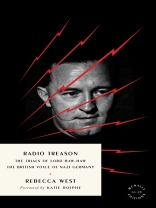The gripping courtroom drama of a Brooklyn-born Englishman who became the voice of Nazi Germany, by “one of the most brilliant and erudite journalists of the century” (The New York Times).
In 1945, The New Yorker commissioned star reporter Rebecca West to cover the London trial of William Joyce, who stood accused by the British government of aiding the Third Reich. Captured by British forces in Germany, Joyce was alleged to have hosted a radio program, Germany Calling, devoted to Nazi propaganda and calls for a British surrender.
The legal case against Joyce (known as “Lord Haw-Haw” for his supposedly posh accent) proved to be tenuous and full of uncertainties. Yet each new piece of evidence added to West’s timeless portrait of a social reject who turned to the far right, who rose through the ranks without ever being liked, and who sought validation through a set of shared hatreds—of elites, of communists, and especially of Jews.
As a work of psychological suspense, Rebecca West’s Radio Treason anticipates Truman Capote, Janet Malcolm, and Joan Didion at their best. As a study in political extremism, as Katie Roiphe writes in her foreword, “It is as if Lord Haw-Haw has been transported from her time into ours.”
O autorze
Katie Roiphe is the director of the Cultural Reporting and Criticism program at New York University. She is the author, most recently, of The Power Notebooks and The Violet Hour. She is currently a columnist at The Wall Street Journal and has contributed to The New York Times, The Atlantic, Harper’s, Esquire, The Washington Post, The Guardian, the Financial Times, and The Paris Review.












